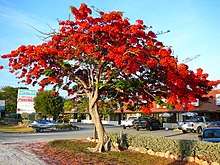Poinciana (song)
"Poinciana" is a song by Nat Simon with lyrics by Buddy Bernier written in 1936.

Background
The song has been identified as a development of a Cuban folk song entitled "La Canción del Árbol" whose title translates as "the song of the tree", the royal poinciana being a favorite Caribbean flowering plant.[1][2] However composer Nat Simon would claim the song's tune came to him while he was dining at Manhattan Theater District restaurant Leone's, and that he jotted down a rough draft of the melody on his table's cloth which - with Leone's permission - he took home to work out the completed melody at his piano. Lyrics for the song were completed in about thirty minutes by Buddy Bernier, who cited as his inspiration a postcard of a royal poinciana tree he'd recently received from Florida.[3]
Reportedly "Poinciana" was largely overlooked for several years being somewhat longer than a typical contemporary song. Orchestra leader Jerry Wald was a rare early aficianado of the song, and Wald's showcasing of "Poinciana" during his 1943 gig at the Hotel New Yorker has been credited with boosting its profile,[4][5] "Poinciana" being recorded in 1943 by Glenn Miller with his Army Air Force Band, with three 1944 recordings of the song afforded hit status, being those by Benny Carter and His Orchestra; Bing Crosby (recorded October 1, 1943);[6][7] and David Rose and His Orchestra.[8]
Notable recordings
Its popularity reinforced by its appearance in the 1952 film Dreamboat, "Poinciana" has become a standard of Latin jazz: the theme song of pianist Ahmad Jamal - whose version, introduced on the 1958 album At the Pershing: But Not for Me, would be showcased on the soundtrack of the 1995 film The Bridges of Madison County[9][10] - the song has also been recorded by Frank Sinatra, George Shearing, Dave Brubeck & Paul Desmond, Johnny Mathis, Nat King Cole, Vic Damone, Keith Jarrett, Percy Faith, McCoy Tyner, Diane Schuur, Caterina Valente, Robert Goulet, The Four Freshmen, MFSB, The Manhattan Transfer, Steve Lawrence (his inaugural disc and a chart hit with #21 peak), Lew Tabackin, Gerry Mulligan with Chet Baker, Cal Tjader, Jerome Richardson, Shelly Manne, Billy Taylor, Booker Ervin, Aaron Goldberg, Gato Barbieri, Gary Burton, Lou Donaldson, and Vulfpeck. In 1978, disco duo Paradise Express recorded a version which made the top 20 on the disco charts.[11] Paquito D'Rivera & Chano Domínguez also recorded the song
References
- Giddins, Gary (2018). Bing Crosby: Swinging on a Star: the war years, 1940-1946. NYC: Little Brown & Co. ISBN 978-0316887922.
- Ted Gioia, The Jazz Standards: A Guide to the Repertoire p. 337 2012 "... 1996 Poinciana Composed by Nat Simon, with lyrics by Buddy Bernier And what exactly, you ask, is a Poinciana? ... They based the song on a Cuban folk tune named "Cancion del Arbol", which translates as—yes, you guessed it!"
- Racine Journal-Times 22 March 1944 "'Poinciana' Theme Written on Restaurant Tablecloth" by Jack Gaver p.2
- Lincoln Star 8 June 1944 "Corporal Writes Song Hits" by p.7
- Billboard vo 56 #28 (8 July 1944) p.4
- "A Bing Crosby Discography". BING magazine. International Club Crosby. Retrieved September 9, 2017.
- https://digital.library.unt.edu/ark:/67531/metadc1633239/m1/
- Whitburn, Joel (1986). Joel Whitburn's Pop Memories 1890-1954. Wisconsin, USA: Record Research Inc. p. 568. ISBN 0-89820-083-0.
- Garcia, Gilbert (January 14, 1999). "Ahmad's Blues". Phoenix New Times.
- Hodgins, Paul (October 16, 2018). "Jazz Great Ahmad Jamal Comes to Orange County". Voice of OC.
- Whitburn, Joel (2004). Hot Dance/Disco: 1974-2003. Record Research. p. 198.